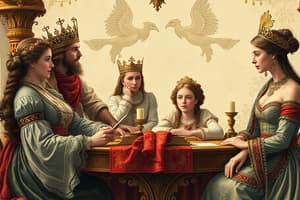Podcast
Questions and Answers
What was the Albany Plan of Union?
What was the Albany Plan of Union?
A plan proposed by Benjamin Franklin in 1754 to unite the 13 colonies for trade and defense.
What did the Peace of Paris accomplish?
What did the Peace of Paris accomplish?
It ended the Seven Years War and resulted in Britain acquiring land east of the Mississippi and Canada.
What was Pontiac's Rebellion?
What was Pontiac's Rebellion?
An Indian uprising in 1763 against British expansion led by Chief Pontiac.
What did the Proclamation of 1763 state?
What did the Proclamation of 1763 state?
What was the Currency Act?
What was the Currency Act?
What did the Sugar Act do?
What did the Sugar Act do?
What were the Quartering Acts?
What were the Quartering Acts?
What was the Stamp Act?
What was the Stamp Act?
Who were the Sons of Liberty?
Who were the Sons of Liberty?
What is meant by visual representation in the context of colonial governance?
What is meant by visual representation in the context of colonial governance?
What is actual representation?
What is actual representation?
What was the Declaratory Act?
What was the Declaratory Act?
What were the Townshend Acts?
What were the Townshend Acts?
What were the Committees of Correspondence?
What were the Committees of Correspondence?
What were the Coercive Acts?
What were the Coercive Acts?
What was the significance of Lexington and Concord?
What was the significance of Lexington and Concord?
What is the main argument of 'Common Sense' by Thomas Paine?
What is the main argument of 'Common Sense' by Thomas Paine?
Study Notes
Albany Plan of Union
- Proposed by Benjamin Franklin in 1754 to unite the 13 colonies for trade and military cooperation.
- Aimed to establish an intercolonial government and a tax system for defense.
- The plan was ultimately rejected by both the colonies and the British Crown.
Peace of Paris
- Ended the Seven Years War/French and Indian War between Britain and France.
- Resulted in Britain acquiring all land east of the Mississippi River, including Canada.
- Effectively removed French influence from mainland North America.
Pontiac's Rebellion
- Occurred in 1763, led by Ottawa chief Pontiac against British expansion in the Ohio Valley.
- Involved the destruction of British forts and widespread Indian attacks.
- The uprising led to the issuance of the Proclamation of 1763 by King George III.
Proclamation of 1763
- Forbidden British colonists from settling west of the Appalachian Mountains.
- Required settlers already in the west to return east, aiming to limit westward expansion.
Currency Act
- Restricted colonists from printing their own money.
- Mandated the use of "hard" currency such as gold and silver for transactions.
Sugar Act
- Halved the duty on foreign-made molasses.
- Imposed duties on certain imports and strengthened enforcement through vice-admiralty courts.
Quartering Acts
- Required colonial legislatures to supply and house British troops stationed in America.
Stamp Act
- Imposed a tax on all printed goods including newspapers, books, and contracts.
- Affected all colonists, leading to significant opposition and protests.
Sons of Liberty
- A radical political group formed by Samuel Adams in response to the Stamp Act.
- Utilized both peaceful and violent methods to protest British policies.
Visual Representation
- Colonists argued they lacked representation in Parliament, which claimed to act in their best interest.
- Concept of visual representation suggested that Parliament considered colonial interests without actual colonial representation.
Actual Representation
- Belief that Americans should have directly elected representatives in Parliament to be fairly taxed.
Declaratory Act
- Passed in 1766, it asserted Parliament’s right to legislate for the colonies in all matters.
- Reaffirmed Parliament's authority to tax and govern the American colonies just as it did in Britain.
Townshend Acts
- Introduced in 1767, these were taxes on goods like paint, glass, lead, paper, and tea.
- Sparked boycotts and increased colonial dissent against British economic control.
Committees of Correspondence
- Organized by patriot leader Samuel Adams, these committees facilitated communication between colonies.
- Served to unite colonies in opposition to British actions, sending delegates to the First Continental Congress.
Coercive Acts
- Also known as the Intolerable Acts, aimed to punish Massachusetts.
- Included the Boston Port Act, Massachusetts Government Act, trials for royal officials in England, and expanded quartering provisions.
Lexington and Concord
- Beginning on April 8, 1775, British troops aimed to seize colonial weapons and arrest leaders.
- The confrontation on April 19, 1775, resulted in the "shot heard round the world," initiating armed conflict.
Common Sense
- A pamphlet by Thomas Paine advocating for colonial independence from Britain.
- Argued that it was the colonies' right to establish themselves as an independent nation.
Studying That Suits You
Use AI to generate personalized quizzes and flashcards to suit your learning preferences.
Description
Test your knowledge on the Albany Plan of Union and related historical events. This quiz covers key concepts and terms, including Benjamin Franklin's proposals and the Peace of Paris. Challenge yourself to understand the early efforts at uniting the American colonies.




